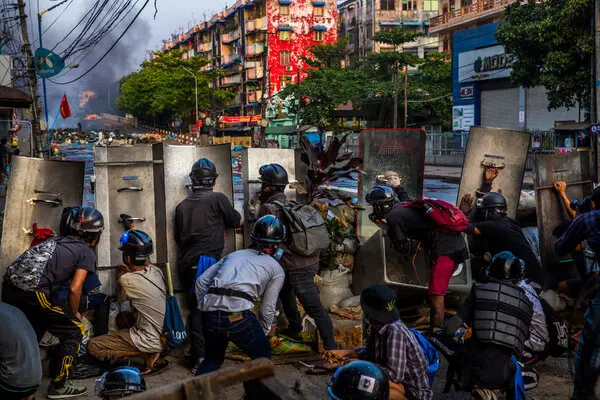Authors: Dominic Faulder, Gwen Robinson and Marwaan Macan-Markar
Affiliation: NIKKEI Asia
Organization/Publisher: NIKKEI Asia
Date/Place: April 14, 2021/Japan
Type of Literature: The Big Story
Word Count: 3395
Link: https://asia.nikkei.com/Spotlight/The-Big-Story/Failed-state-Myanmar-collapses-into-chaos
Keywords: Myanmar Coup, Foreign Relations
Brief:
After a coup by the army in Myanmar on February 1, democracy protests have been started countrywide. Many people have been killed during the protests, and more than 3,000 activists and civil society leaders have been detained. The coup took place after almost 5 years of the democratic experience in Myanmar. Even though NLD (National League for Democracy) won the election in 2015, the military retained three key ministries and a 25% bloc in parliament (as required by its constitution) to veto any constitutional changes. Thereby, the military with this power in hand initiated its February 1 coup. The International Community has not gone beyond words of condemnation. Even if ASEAN countries have said that they have deep concerns about Myanmar, they have avoided any meaningful response because of constraints by a code of mutual non-interference. The EU and the US have sanctioned individuals and groups who have collaborated with the coup and suspended all trade deals; but the army expected this and has drawn nearer to Russia and China. Many non-governmental organizations and foreign companies in the country have called for respect for human rights and a return to democracy and the rule of law. Although the coup has affected Myanmar’s economy, the Junta has an iron grip on the country’s lucrative gas production. Offshore gas sales are an important source of foreign exchange and constitute 20% of Myanmar’s exports. The Junta is trying to enhance relations with other countries, especially Russia and Thailand. Russia’s Deputy Defense Minister, Gen. Alexander Fomin attended the Armed Forces Day which took place after the coup. Russia had good relations with the NLD government as well, and Russia’s interest generally in Myanmar focuses on arms sales. On the other hand, General Min Aung Hlaing after seizing power sent a letter to the Prime Minister of Thailand. He was trying not to depend on China a lot, by reason of China’s supporting armed groups based along Myanmar’s northern border.
By: Esra Ibrahimagaoglu, CIGA Research Intern




